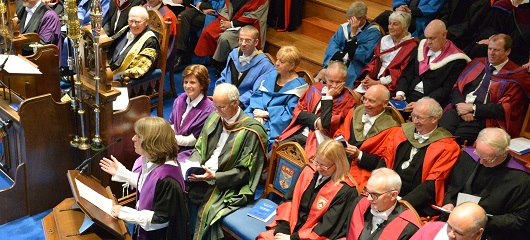Graduation address: Professor Lorna Milne

Chancellor, ladies and gentlemen, let me be the first to say to our new graduates: congratulations. We are very proud of you, and – if I say so myself – proud of ourselves for the education we have given you. My colleagues on this podium have worked extremely hard to support you. For you, they have lectured, tutored, supervised, commented on chapters, marked assignments, granted extensions, mopped up tears, bullied the Pro Deans, sacrificed their weekends, pretended not to notice you in the wine shop and generally treated you as the brilliant, original, resourceful, hilarious people that St Andrews students usually are.
Your friends and family who are with us today are also bound to be very proud of you, and looking forward to the next steps in your career following your studies. They will be watching with admiration as you strike out into employment or further study. They will smile as you take new challenges in your stride; they may be forgiven if they also raise a cheer as your final student rent cheque clears, or if they joyously – at last – select new curtains for the redecoration of your bedroom.
Most of you have devoted the last three or four years of your lives to disciplines that sound very different from one another: medicine and management. It strikes me however that, among you, you now possess a prodigious knowledge of the most important, fascinating and dangerous phenomenon on the planet: human beings. Some of you, obviously, have acquired a deep scientific understanding of the human body but, more crucially for your daily lives, you are all now well versed in different aspects of human behaviour: what makes people anxious? What motivates them? How do they conduct themselves in different contexts? What parameters frame their actions and discourse?
In studying such general-sounding questions and coming to broad conclusions about the human species, you will nevertheless have become more acutely aware than ever of how various human beings are, in every possible manner. That sounds like plain common sense – of course no two people are identical (or at least not yet), and anyone who attends this university could hardly escape the fact of our very great heterogeneity. During your time here you will have met other students who are in some ways very like you – all terrifically bright; all good at their chosen subject; mostly pretty enterprising and energetic; mostly given to bouts of complete madness at least twice a year, involving ridiculous quantities of shaving foam every Autumn, and prancing around the East Sands while wearing next to nothing every May Day. Yet at the same time, those people are all so different: our staff and students come from more than 120 countries and all sorts of backgrounds, they practise a vast range of cultures and creeds and their personalities diverge in innumerable ways. So of course it is a commonplace to assert human diversity, but your intellectual activities give you an especially acute insight into it. They also give you a responsibility to respond to it thoughtfully.
And that points us to another, deeper competence you all share as a result of your degree programmes, leading to the award you now hold in your hands. You have all spent considerable time analysing grave ethical questions: those that confront doctors and medical researchers on the one hand and, on the other hand, those that preoccupy anyone committed to responsible leadership in commercial and social organisations. The heightened appreciation of both ethics and diversity that you have acquired through your studies qualifies you better than many others of your generation to take a lead in promoting tolerance, showing respect for difference and treating others with dignity and decency wherever you go. The hood that now rests on your shoulders may represent learning; but that learning in itself also places on your shoulders a duty to practise the human values that you have studied here, at all times and in all situations.
Years from now, you will look back on today. You will not be able to believe how the time has flown. You will ask yourself what happened to all those tutors you loved (or did not); you will marvel at the prowess of some of your classmates and shake your head over some of the others. You will recollect the wonderful times that led you to this moment: a frosty walk into town in November; a day on the pier when it was really too windy to be safe; working late in the quiet library with darkness pressing in at the windows; a chilly soaking after the exams in May; the many, many friends you made. Thinking back, you will recall what a lovely day you had at graduation. You will not remember one word that I have just said.
But what you must never forget are the intellectual and moral principles of tolerance, respect and dignity that you have developed here. Hold true to them. Live them. We are tremendously proud of you today. Please make us proud of you forever.
Category University news